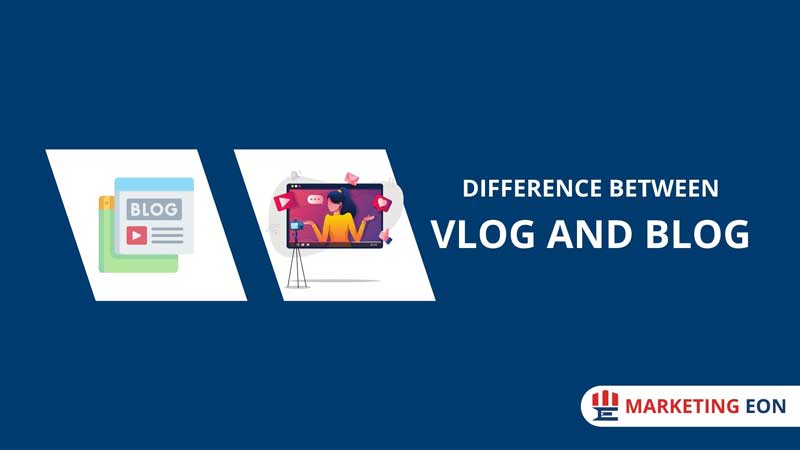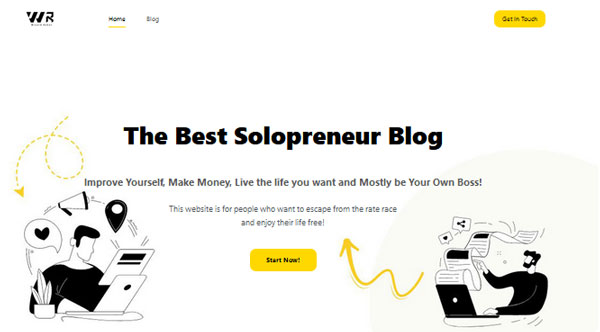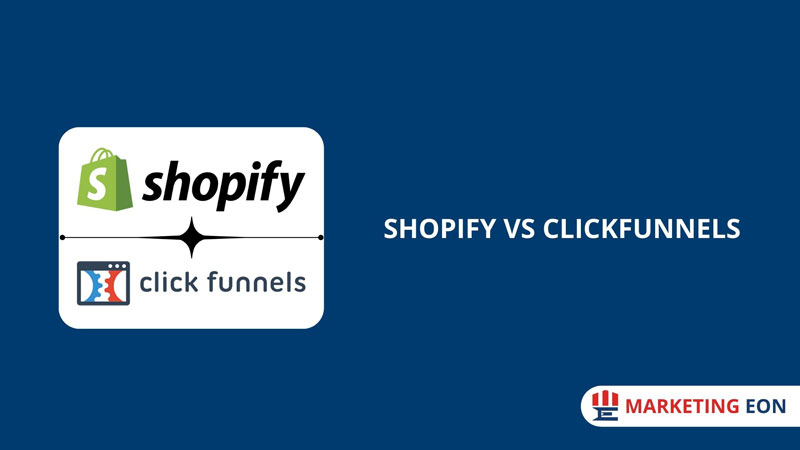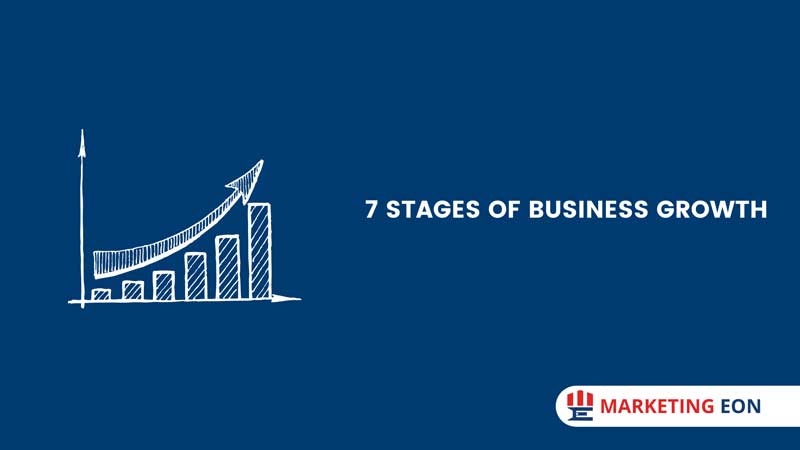Do you know the difference between Vlog and Blog?
In digital content creation, these two terms often come into play. Sadly, many people do not know the difference between vlog and blog. While they might sound similar, they represent distinct mediums through which creators share their stories, insights, and experiences with their audience.
In this post, we’ll discover the difference between vlog and blog, shedding light on their unique characteristics and how they serve purposes in online content creation. You will also learn the prospects of starting a Vlog vs blog and building a career where you can earn much money.
Overview of the Difference Between Vlog and Blog
Formal Definition and Key Features: Blog vs Vlog
Let’s know the formal definition of Blog vs Vlog and their unique features so you can easily understand their differences.
What is a Blog?
A blog, short for “weblog,” is a platform where individuals or groups of writers publish written content in a chronological format. These entries, commonly known as posts, cover various topics, including personal experiences, informational articles, opinion pieces, product reviews, and more. Blogs often incorporate text, images, and occasionally videos to engage readers and convey information effectively. Blogs can be written for specific niches, such as business, travel, marketing and solopreneur blogs.
Key Features of a Blog:
1. Written Content: Blogs primarily consist of written text, making them ideal for conveying detailed information and fostering deeper engagement through storytelling.
2. Flexibility: Bloggers can explore various writing styles, from formal essays to conversational pieces, tailored to their target audience.
3. Search Engine Optimization (SEO): Blogs need to be optimized for search engines such as Google, Bing, etc, so that people can find them on the first page of search engines.
4. Archives: Blog posts are archived, allowing readers to explore past entries easily and delve into a blog’s extensive content library.
What is a Vlog?
A vlog, short for “video blog” or “video log,” involves the creation of video content to share experiences, insights, or narratives with an audience. Vlogs often feature the vlogger (the creator) speaking directly to the camera, providing viewers with a more personal and immersive experience. Like blogs, vlogs cover various topics, from travel adventures and lifestyle tips to cooking tutorials and entertainment.
Key Features of a Vlog:
1. Video Format: Vlogs primarily rely on video content, offering a dynamic and visual medium for storytelling that appeals to viewers seeking engaging and entertaining content.
2. Personal Connection: Vloggers often establish a personal connection with their audience by showcasing their personality, emotions, and experiences through video, fostering a sense of authenticity and relatability.
3. Visual Appeal: Vlogs leverage visuals, including footage, graphics, and animations, to enhance storytelling and captivate viewers’ attention, making them more memorable and shareable.
4. Editing and Production: Vlogs involve editing and post-production to refine the content, adding effects, music, and captions to create a polished final product.
Key Differences Between Vlog and Blog
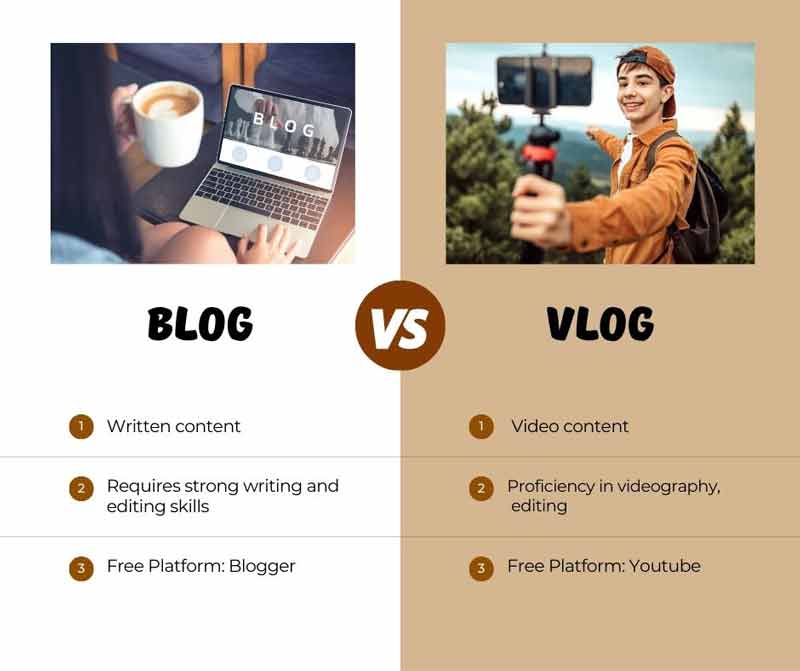
1. Medium: The primary difference between vlogs and blogs lies in their medium.
Blogs rely on written content with images and sometimes videos to support the writing. On the other hand, vlogs are mainly based on video content where vloggers present all the content in the videos.
2. Platform: Bloggers and bloggers need platforms to create and share content with audiences. There are free and popular platforms out there for blogging and vlogging.
The most famous blogging platform is Blogger, which is completely free and an excellent resource for beginners. Anyone can create an account on Blogger for free with an email address and start blogging.
In the same way, YouTube is one of the most popular Vlogging platforms, and it’s free, too. Having a Gmail is all you need to create a YouTube account and start doing Vlogs.
3. Skill Sets: Creating a blog requires strong writing and editing skills. Many people started blogging as a hobby but ended up as a professional blogger.
Producing vlogs demands proficiency in videography, editing software, and on-camera presence. You must be confident enough to be in front of the camera and deliver your content to your audiences.
4. Engagement: While both mediums aim to engage audiences, vlogs offer a more immersive and visual experience, creating a solid connection between the creator and the viewer.
5. Accessibility: Blogs are accessible to individuals with varying internet speeds and preferences for consuming written content, whereas vlogs require a stable internet connection and the ability to watch videos.
6. Resources: To start blogging, you need a computer, laptop or tablet to log in to the platform and write comfortably without complication. You may need some SEO knowledge to get organic traffic to your blog. You may use SEO tools such as SEMrush for keyword research.
On the other hand, you need a good camera or smartphone to start vlogging. You need to have videomaking skills to make attractive videos. You must also know about video editing, as you must edit your videos regularly. You should be familiar with video editing software to start vlogging.
Career Prospective: Blogging vs Vlogging
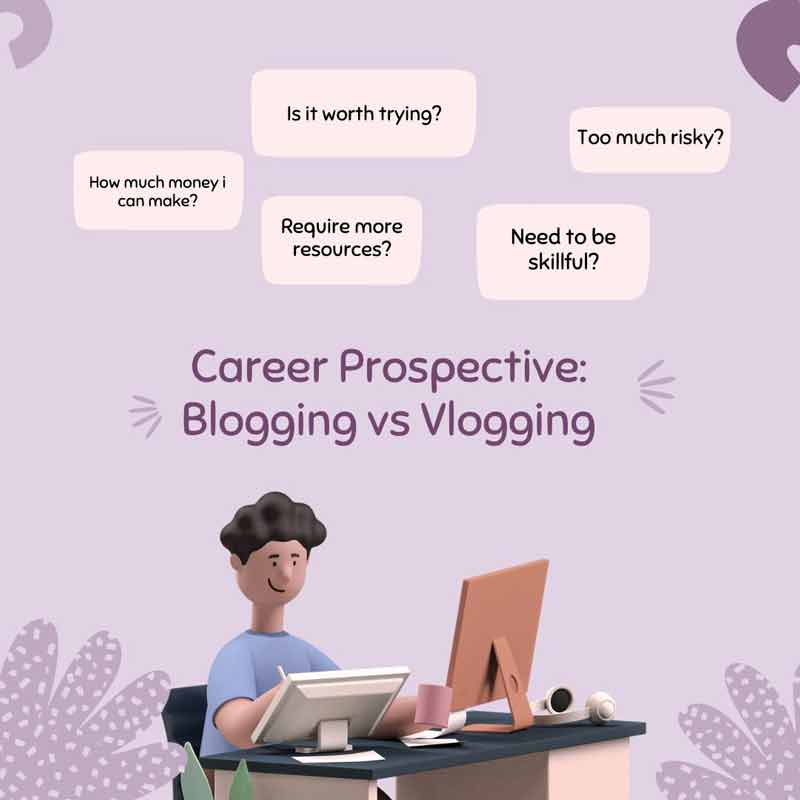
Both can be taken as a profession because you can earn enough money like any other profession. If you can crack it properly, you can earn even more than a 9 to 5 job while living a free life. This choice is very subjective, as many people consider blogging and vlogging their primary profession, while others consider it a side hustle.
If you want to know the amount of money you can earn from vlogging and blogging, I can only give you earning potential as there is no fixed amount or limitation. You need to wait for a while to see the first money coming, as it takes time to establish a blogging site or vlogging channel.
You will start earning when you have visitors or viewers on your site or channel. It may start with $100 a month or $500 or even more based on the audiences you have and your income sources. I will tell you now how to earn money from your blogging vs vlogging.
Making Money: Blogging vs Vlogging
There are so many ways to earn money from blogging and vlogging. Although there are many fundamental differences between vlogs and blogs, their ways of earning money are similar.

How to make money blogging
As mentioned, you can start blogging with a free platform like Blogger. Blogging on a self-hosted website with a good domain name will offer you enough freedom to go for different income sources. You can use WordPress, one of the best CMS for making a blog website. If you have a blogging website, you can earn money from these popular sources:
1. Display Advertising: Utilize display advertising networks such as Google AdSense to showcase ads on your blog. Revenue is generated based on factors like ad clicks or impressions.
2. Affiliate Marketing: Collaborate with companies and promote their products or services through unique affiliate links within your blog posts. You earn a commission for every sale or action-driven through these links.
3. Sponsored Content: Partner with brands to create sponsored blog posts that feature their products or services. You can charge a fee to publish this content on your blog.
4. Sell Digital Products: Develop and sell digital products like e-books, online courses, templates, or guides relevant to your blog’s niche. Once created, these products can provide a steady source of passive income.
5. Offer Services: Leverage your expertise in your blog’s niche to provide consulting, coaching, freelance writing, or other services to your audience. You can promote your services directly on your blog or through a dedicated services page.
6. Membership or Subscription Model: Offer premium content, exclusive resources, or access to a members-only community for a recurring subscription fee. Platforms like Patreon or WordPress plugins can facilitate this model.
7. Sponsorships and Partnerships: Collaborate with brands or companies as sponsors for your blog. This could involve sponsored posts, banner ads, or other promotional opportunities tailored to your audience.
8. Sell Physical Products: If applicable to your blog’s niche, consider selling merchandise, branded products, or curated items through your website.
9. Freelance Writing: Showcase your writing skills on your blog to attract freelance writing opportunities from other publications or websites.
10. Events and Workshops: Organize and host events, workshops, webinars, or meetups related to your blog’s niche. You can charge admission fees or partner with sponsors to cover costs and generate revenue.
11. Consulting or Coaching: Offer personalized consulting or coaching services based on your expertise. This could include one-on-one sessions, group coaching programs, or workshops.
12. Podcasting: Start a podcast aligned with your blog’s niche and monetize it through sponsorships, advertising, listener donations, or promoting your products/services.
How to make money Vlogging
1. YouTube Partner Program: Apply for the YouTube Partner Program to enable monetization features on your vlog channel. This allows you to earn revenue through advertisements displayed before, during, or after your videos. You receive a share of the ad revenue generated by your content.
2. Affiliate Marketing: Incorporate affiliate links in your vlog descriptions or within the video content to promote products or services. When viewers make purchases through your affiliate links, you earn a commission. Select products or services relevant to your vlog’s theme to enhance conversion rates.
3. Sponsorships and Brand Collaborations: Collaborate with brands or companies for sponsored content or brand collaborations. This may involve showcasing products, mentioning brands, or creating dedicated videos about their offerings. Negotiate compensation based on factors such as audience reach, engagement metrics, and the scope of the partnership.
4. Merchandise Sales: Develop and sell branded merchandise such as apparel, accessories, or items related to your vlog’s content. Platforms like Teespring or Spreadshirt allow you to design and sell custom merchandise without upfront costs.
5. Crowdfunding Platforms: Utilize crowdfunding platforms like Patreon or Ko-fi to enable your viewers to support your vlogging endeavors through voluntary donations or subscriptions. Offer exclusive perks or content to incentivize supporters to contribute regularly.
6. Paid Memberships or Subscriptions: Provide access to premium content, early releases, or exclusive benefits to viewers who become paid members or subscribers of your vlog channel. Platforms like YouTube Memberships or Patreon enable you to create tiered membership levels with varying rewards.
7. Product Reviews and Endorsements: Partner with companies to review their products or services on your vlog. Negotiate compensation for genuine reviews, demonstrations, or endorsements. Maintain transparency by disclosing sponsored content to your audience.
8. Events and Meetups: Organize events, meetups, or workshops for your vlog audience. Charge admission fees or seek sponsorship to cover expenses and generate revenue. Events offer opportunities for direct interaction with your viewers and can foster a sense of community around your vlog.
9. Consulting or Coaching Services: Utilize your vlogging expertise to offer consulting or coaching services. Provide personalized advice, guidance, or workshops related to vlogging, content creation, or niche-specific topics.
10. Content Licensing: License your vlog content for use by other creators, media outlets, or businesses. Earn royalties or one-time payments to allow others to use your videos in their projects, advertisements, or promotions.
11. Brand Ambassadorships: Become a brand ambassador for companies or products aligned with your vlog’s focus. Receive compensation, complimentary products, or other perks in exchange for promoting the brand on your vlog and social media platforms.
12. Consulting or Coaching Services: Utilize your vlogging expertise to offer consulting or coaching services to aspiring vloggers or businesses seeking guidance on video content creation, audience engagement, or video marketing strategies.
Conclusion
Our writing on the “difference between Vlog and Blog” aims to explain quickly, reduce misunderstandings, and clearly explain these two well-used terms. While blogs and vlogs serve as platforms for creators to share their stories and insights, they differ significantly in medium, engagement, accessibility, and required skill sets. It depends on the audiences, whether they prefer the written word or visual storytelling, as both mediums offer distinct opportunities for creators to connect with their audience and leave a lasting impact on digital content creation.
Moreover, “Blogging vs Vlogging” can be a topic for argument, but both have promising career prospects and one can make a good amount of money by doing so.
You may also read: How to Become a Media Buyer
